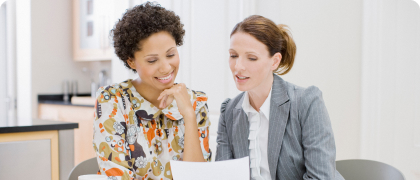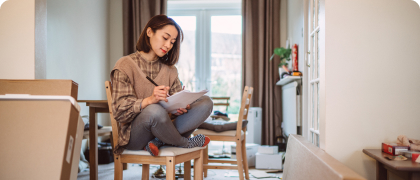Published: 10 October 2023
How much does it cost to buy a house in the UK?
Wouldn't it be great if the cost of buying a home boiled down to the price tag and nothing more? Unfortunately, things aren't quite that simple. House buying comes with a whole host of costs covering not only the purchase itself, but also the administration and assurances around it.
Understanding and totting up these costs can be a daunting prospect, particularly if you're a first-time buyer who's never dealt with them before. Couple that with a spiralling housing market and rising mortgage rates, getting to grips with the costs of your purchase before you get started has never been more important.
So, where to start? Don't worry, we've put together a short guide for you on the costs you need to consider.
How much deposit do I need for a house?
Generally speaking, the deposit you'll need will make up 5-10% of the property's value, although you can go higher if you can afford it. For first-time buyers, schemes like ISAs are available, which ensure you'll only need to put down 5%.
Already know where you want to buy? One way to get a rough idea of the deposit you'll need is by looking at typical property prices in the area you're looking. Can you afford to pay 5-10% of that price upfront? Remember to also consider your budget and what you can afford to pay in monthly . You can use our Mortgage Affordability Calculator to get an idea of what you could afford to borrow.
Mortgage costs
While your mortgage deposit and the following monthly repayments are the main costs to consider for your mortgage, there are usually a few other fees you'll need to factor into your immediate budget. These are:
- A booking fee
- An arrangement fee
- A mortgage valuation fee
Not every mortgage provider will charge all these fees, but you can expect to spend roughly £1,000-£2,000 on mortgage fees in addition to your deposit and repayments. If you can, it's better to pay these off upfront rather than tack them onto your loan, as you won't have to pay interest on it.
Stamp Duty
Stamp Duty Land Tax (SDLT), better known as stamp duty, is a tiered tax due on property purchases. Current purchase price thresholds mean that most first-time buyers don't have to pay stamp duty, but it's something you'll need to bear in mind if you're buying a more expensive property or moving home.
Stamp duty for first-time buyers
First-time buyers are exempt from paying stamp duty when purchasing properties up to a value of £300,000. You'll pay stamp duty as a first-time buyer if you buy a house for more than £300,000, but you'll get a discounted 5% rate on properties up to £500,000. You'll have to pay the full rate on anything above that.
Stamp duty for home movers
Stamp duty will be charged if you're buying your next property and it's over £250,000. You'll pay a 5% rate on any purchase of £250,001-£925,000, 10% on £925,001-£1.5m and 12% on anything above that.
Stamp duty for non-residential properties
If you're buying another property that you aren't planning to live in (such as a holiday home) you'll pay stamp duty on any purchase over £150,000.
If you'd like to know more about stamp duty thresholds and how much you'll pay, visit the gov.uk page on SDLT. If you live in Scotland or Wales, there are similar taxes to stamp duty called Land and Buildings Transaction Tax (LBTT) and Land Transaction Tax (LTT). These are tiered differently to English stamp duty.
Legal and conveyancing fees
Once you've had an offer accepted on a property, you'll need to hire a licensed solicitor or conveyancer to handle the legal elements of the process. There are a number of different legal fees you'll need to pay, but you can expect them to come through gradually as the purchase progresses. Some of the fees include:
- Legal fees - the cost for your solicitor, which will be charged either as a flat rate or a percentage value of the property. Expect to pay anywhere from £500-£1,500
- Money transfer fees - the costs for transferring cash between the different parties involved in the purchase. Expect to pay around £50 per transfer
- Land registry fee - the costs for registering the property with you as the new owner. Land registry fees can be quite broad, depending on property value. You can get an idea of how much it might cost you before you make an offer
- Search fees - the costs for searches carried out by your solicitor to help to identify potential risks to the property. For example, flooding issues and mining history
- Leasehold fees - the fees charged if you're buying a leasehold property. There are three main leasehold charges: ground rent, service charges and administration charges
House survey costs
You don't have to get a survey of your new house before completing the purchase. However, it's generally recommended to make sure you're buying the property you expect instead of one with hidden issues. (*1) will depend on three things:
- The level of survey you get
- The value of the property
- The location of the property
There are three tiers of survey that offer increasing levels of detail in their investigations. Which one is best for you will largely depend on the age and condition of the property you're buying:
- RICS Home Survey Level 1 (basic survey best suited for modern properties in good condition) - £300-£900
- RICS Home Survey Level 2 (mid-level survey suitable for most properties in OK condition) - £400-£1,000
- RICS Home Survey Level 3 (in depth structural survey suitable for older properties and ones in poor condition) - £600-£1,500
Moving costs
Moving costs can vary widely depending on a few factors, including:
- The amount of furniture and other belongings you need to move
- How far you're moving
- The level of removal service you choose
Most of the time you'll need to hire a van. For bigger jobs, you may need to use a removals company. Costs can range from under £100 for basic assistance to upwards of £1,000 for complete removals services including insurance and packing.
Estate agent fees
If you're moving home and using an estate agent to sell your property, you'll need to pay them a fee either as a percentage of the sale plus VAT, or a flat fee. You'll agree the fee with them before they list your property. Percentage fees are typically 1-3% of the property's sale value plus VAT.
So, how much does it cost to buy a house?
With so many variables around your status as a buyer, property values and the different services required, it should come as no surprise that there's no 'typical' amount that you can expect to pay through the buying process. Research (*2) suggests some rough values for first and next-time buyers:
- Average cost of buying first home (excluding deposit and mortgage costs) - around £2,200
- Average cost of moving home (excluding deposit and mortgage costs) - around £14,200
The difference in these estimated costs comes down mostly to stamp duty and estate agent fees – neither of which most first-time buyers will have to pay.
Can we help you to buy a home?
We're a mortgage provider for first-time buyers and home movers alike. From remortgaging to, you'll find a broad range of competitive deals with us.
Want to know more? Browse our full range of mortgage options today.
Sources:
* 1 - For further information, please visit - https://www.which.co.uk/
* 2 - For further information, please visit - https://www.reallymoving.com/
This Leeds Building Society article is intended for information purposes only and is accurate at the time of publication. It’s always advisable to verify any information before relying on it.



